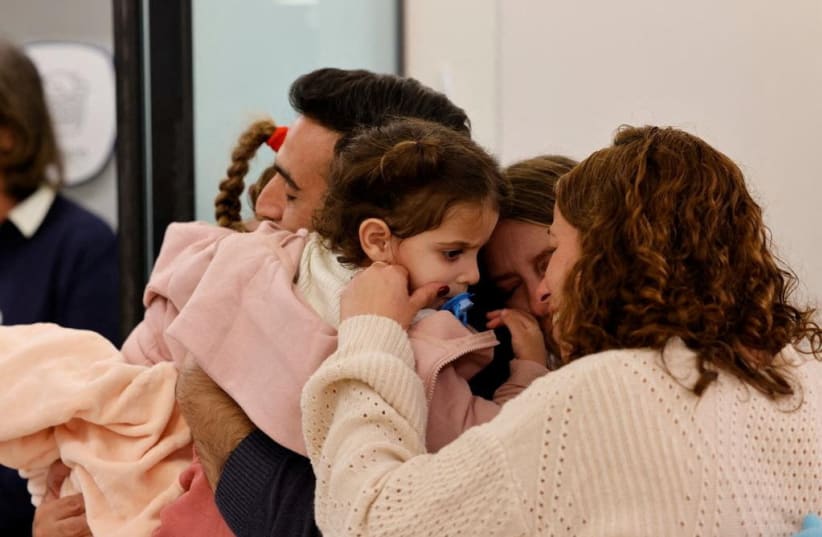ARTICLE AD BOX
Procedures include pregnancy tests, checks for starvation and nutrient imbalance, and private psychological treatment.
By DR. ITAY GAL JANUARY 16, 2025 12:31 Aviv Asher, 2,5-year-old, her sister Raz Asher, 4,5-year-old, and mother Doron, react as they meet with Yoni, Raz and Aviv's father and Doron's husband after they returned to Israel to the designated complex at the Schneider Children's Medical Center.
(photo credit: Schneider Children's Medical Center Spokesperson/Handout via REUTERS)
Aviv Asher, 2,5-year-old, her sister Raz Asher, 4,5-year-old, and mother Doron, react as they meet with Yoni, Raz and Aviv's father and Doron's husband after they returned to Israel to the designated complex at the Schneider Children's Medical Center.
(photo credit: Schneider Children's Medical Center Spokesperson/Handout via REUTERS)
The Health Ministry has published the medical protocol for the reception of hostages from Hamas captivity in light of the recently announced deal, outlining the stages of care, treatment, and long-term support.
The six designated hospitals for initial medical care are Ichilov, Beilinson, Sheba, Assaf Harofeh (in the central region), Barzilai, and Soroka. These hospitals are positioned close to Gaza to treat severe cases quickly. The Health Ministry recommends a minimum hospitalization period of four days for each returnee, though this is subject to the discretion of the individual and their family.
Each returned hostage will be treated in separate facilities designed specifically for hostages. These will include private rooms for the returnee and their accompanying family members and individuals. Hospitals have been instructed to separate general areas for larger gatherings from the private spaces, which include sleeping areas, meeting rooms, and rest zones. Each room will have its own bathroom and shower facilities.
The “Returnee Wing” will also house spaces for military representatives, allowing isolated meetings to minimize the congestion caused by large crowds in hospital corridors. This decision comes from previous hostage return experiences where overcrowding hindered medical treatment and disrupted the recovery process. Hospitals have been instructed to limit the number of visitors in these areas, which will be closed to visitors outside designated family visitation times.
Once the return of a hostage is confirmed, hospitals will receive their personal medical information. This data will be reviewed early to assess any health issues arising from prolonged captivity, including potential complications or the exacerbation of preexisting conditions. Some hostages may have had chronic illnesses before the abduction, and hospitals will take care to maintain confidentiality regarding the hostages' medical records.
Hospitals are also tasked with creating a permanent medical support framework for each returnee. This framework will include a designated medical team comprising primary care physicians, nurses, consulting specialists, social workers, psychologists, psychiatrists, dietitians, and forensic physicians. The team will convene as needed to ensure comprehensive care and develop personalized treatment plans.
Social workers will accompany returnees from the moment they are admitted, engaging with them and their families and recommending psychological or psychiatric interventions when necessary. During the hospitalization period, the social worker will identify a key contact person for future follow-up care.
Dietitians will monitor returnees’ weight, height, and abnormal blood test results while managing their complex nutritional needs.
Monitoring health risks
Refeeding syndrome is a significant risk for returnees, and each individual will be closely monitored for signs of this life-threatening condition, which occurs when someone who has experienced prolonged starvation begins consuming food too quickly. This condition can disrupt blood electrolyte levels (such as phosphorus, magnesium, and potassium), leading to dangerous effects on the heart, brain, muscles, and other systems. To avoid this, each returnee will have a personalized dietary plan designed by the dietitian.
Physical treatment will typically begin with correcting blood electrolyte imbalances, followed by gradual, controlled feeding that includes small portions of liquid food that are high in fluid and protein but low in carbohydrates.
Stay updated with the latest news!
Subscribe to The Jerusalem Post Newsletter
Phosphorus, potassium, and magnesium will be administered carefully to stabilize blood levels. Fluid balance will also be monitored to prevent edema or heart failure. Vital signs such as pulse, blood pressure, and blood sugar levels will be closely observed alongside the functioning of the heart, kidneys, and lungs.
Psychological guidance and emotional support will also be a central aspect of care. Reintegration into normal life can involve trauma, which will require professional attention.
Each returnee will be accompanied by a forensic physician, who will be responsible for documenting and collecting medical-legal evidence. This physician will meet with the returnee, conduct necessary examinations, and ensure proper documentation of any findings related to their captivity.
A liaison nurse from the returnee's health fund will be assigned to oversee their medical follow-up from discharge and throughout the coming months and years.
Upon arrival at the hospital, returnees will be examined by emergency medicine professionals and undergo extensive testing, including X-rays, CT scans, or MRIs. They will also undergo blood tests for infectious diseases, blood clotting disorders, and other health conditions related to their captivity. Female returnees of childbearing age will be tested for pregnancy.
Following the necessary evaluations, a decision will be made about whether continued hospitalization is required or if discharge to continue care in the community is appropriate. As noted, a hospitalization period of at least four days is recommended to allow the returnees time to rest, reunite with family, and recover from public attention, all while ensuring their physical and emotional well-being.
Healthcare providers are instructed to establish multidisciplinary outpatient clinics to ensure comprehensive follow-up care. This will include continuous monitoring of the returnees’ medical and emotional health.

 3 hours ago
6
3 hours ago
6








 English (US) ·
English (US) ·